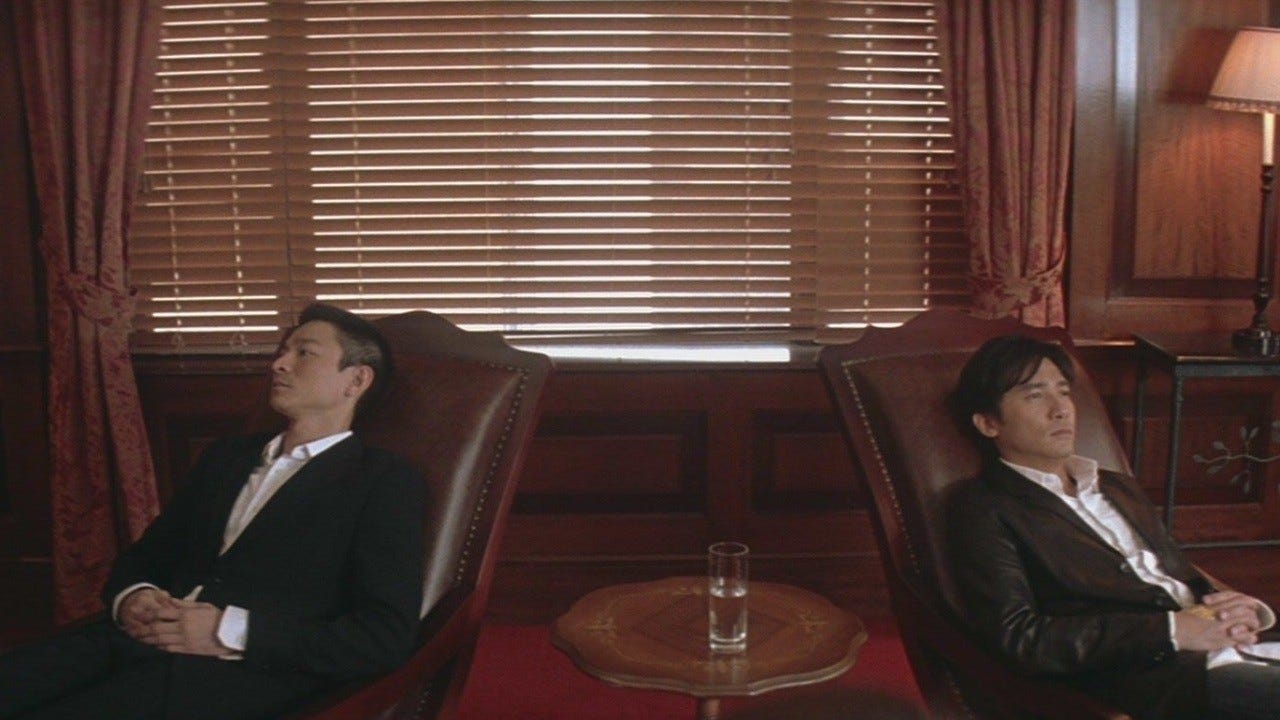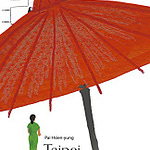Asian Americans are born juggling multiple cultural identities. Some labels come with your birthplace, others are given to us by the history and hopes of our family. Although family expectations are not unique to us, our cultural proclivity for long-term sacrifice adds the weight of generations to these well-meaning wishes. Asian Americans are thus faced with a difficult choice: embrace these expectations or set them aside so we can navigate our own path.
In Episode 19, my guests Stephanie Cheng and Michael Yap debate this choice as we revisit Infernal Affairs— a movie that has as much to say about self-agency and destiny as it does about subterfuge and the criminal underworld. Both protagonists' character arcs climax when they take decisive actions towards the future of their identity. Andy Lau's character proactively sets events in motion to erase his corrupt past, while Tony Leung makes the difficult decision to remain true to his values at the cost of his legal reputation.
To show how deeply ingrained filial piety is in Asian identity, the movie only grants our moles agency over their sense of self after literally killing their father figures. It’s a dramatic move, but the movie's message is not far off. In the podcast we center our conversation and debate different approaches to integrating our parents expectations as a core element of our identity.

“Asians don’t believe in therapy, but we believe in ghosts” -Stephanie Cheng
Stephanie strongly encourages separating ones identity from parental expectation. She believes that rejection gives you the freedom to fail and to craft an identity more suited to operating in our world of constant uncertainty. Michael stands on the other side: returning to Hong Kong after spending his youth abroad and finding fulfillment leaning into family expectations and tradition. Both of my friends have enjoyed success and happiness in their own right— demonstrating that everyone’s story requires personal examination and constant reflection.
Personally, my struggle with family tradition has led me to question the very tribes I identify with. Growing up, my parents interspersed nuggets of Chinese wisdom between efforts to give me a Hallmark American Life. These pieces of advice were usually told through idioms that my Chinese Lit major of a mother would always admonish me for not remembering. However there was one message they would never let me forget: you are, and always will be, Chinese.

This is why Billi’s father pushing back on the “always Chinese” label felt so important
Recently, I've grappled with how much that label means to me. I see a future where Chinese identity is associated with concepts incongruous with my own values. At the same time, Diasporic identity in this context feels weak and almost meaningless. To explain further, I’d like to share an excerpt from a book I am writing. The format is addressed to my (imaginary) future child:
Dear Child,
To Be Chinese
The story of China matters to us in the macro sense, and the story of Taiwan matters to us in the micro sense. Understanding the story of China (along with an equally important understanding of the history of minorities in America) will help you answer questions such as: Where did my values come from? How did my family get here? The story of Taiwan will answer other questions: What were my grandparents like? Where will I find kindred spirits?
For the first 20-odd years of my life, Taiwan was the simple answer to the oft-asked question: “Where is your family from?” (The real answer is that we were from Orange County) I knew my grandparents were from China, but I didn’t understand the careful nuances that might distinguish two Taiwanese citizens of Han Chinese descent. Now, the short answer is still Taiwan, but I always feel the urge to follow it up with a brief history lesson: without China you’re not painting the full picture.
Our family’s path through China and Taiwan matter, and they are sequential acts to the same story. There is no proper delineation. However I want to focus on China first for a couple of reasons: 1) practically speaking, I want to trace our roots back as far as possible and 2) because I believe there will be a tremendous shift in the perception of Chinese identity from when I write this to when you read it.
What does it mean to be Chinese? What are true Chinese values? I, nor anyone else can give you a definitive answer. But the question of Chinese identity dearly matters to our family…
….We are part of the wave of Chinese Diaspora born from World War 2 and the Chinese Civil War. Our elders escaped persecution by the Japanese and reeducation by the Communists and fled to Taiwan, America, Canada, Malaysia, Hong Kong, Singapore and many other parts of the world where they had the freedom to teach us what they believed it meant to be Chinese. But will any of it matter to the rest of the world compared to the money and power of 1.5 billion Mainland Chinese who say otherwise? They share a closer set of values and history underneath a single flag, while the rest of us remain fragmented as we assimilate into other cultures. I want to advise you to not let what the world thinks influence what you believe, but I’d be doing you a disservice if I didn’t tell you it will impact your life.
My parents still hold out hope that one day China, their homeland, will adopt a democratic system. Their parents were involved in the defense of the Republic of China on the mainland and its establishment on the island of Taiwan, and thus they hold this hope close to their heart as a remembrance of the blood, sweat and tears of their mothers and fathers. However, I do not share the same hope. All the evidence points otherwise. The government censors information, builds technology to monitor and control its people, and cracks down with extreme prejudice on any minority group that wants to speak its mind. If I have to bet, I would wager that by the time you are reading this China will be closer to a police state than a full-fledged democracy. Like true Confucian citizens, my parents think only about the long, long, long term future of China. They don’t care if they are not around to see it. In my Westernized opinion-- what’s the point?
I also believe that as an ancient culture, we are taught to think for the long term-- we are taught to look beyond our own lives: cherish the sacrifices our ancestors made and continue to sacrifice for our children. That mindset definitely influences me to write to you. But I’m not sure I carry the same mindset of sacrifice for your generation as my parents did. By the time you read this, I might have left this identity behind. I chronicle our history for you here, but leave the choice to you.










